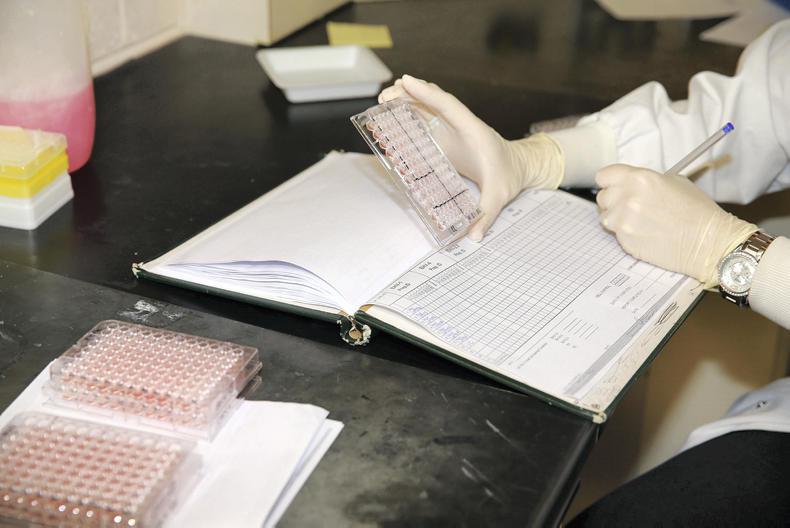The Irish Equine Centre (IEC) and the Irish Thoroughbred Breeders' Association issued the following statements on Thursday afternoon in relation to the outbreak of equine flu in Britain.
Equine influenza is endemic in Europe and North America i.e. outbreaks occur on an almost annual basis.
The virus very rarely causes fatalities in endemic countries but, if sufficient numbers of horses are infected, equestrian events may have to be cancelled to control the spread of the disease.
Since the start of 2019 equine influenza has been diagnosed on a number of premises throughout Ireland. Breeding stock, racehorses, competition and leisure horses are affected.
Clinical signs such as coughing, nasal discharge, swollen glands and fever have been observed in both vaccinated and unvaccinated horses but the latter are worst affected.
There has been an increase in influenza outbreaks in several countries in Europe recently and the first two Irish premises confirmed (a thoroughbred stud farm and a show jumping yard), appear to have epidemiological links to the continent.
The virus has been typed by the OIE Reference Laboratory at the IEC. It belongs to Clade 1 of the Florida sublineage. In addition, the IEC has typed viruses in samples received from recent outbreaks on the continent and confirmed that they are the same strain. The Animal Health Trust in Newmarket has also identified this Clade 1 virus in the United Kingdom.
RAPID SPREAD
Clade 1 viruses predominate in North and South America but have not been identified in Ireland since early 2010. The virus can spread rapidly in a yard particularly if the horses are naïve or lack protective immunity.
In naïve horses the incubation period can be as short as 24 hours but in vaccinated horses may be three to five days. Clinical signs in vaccinated horses may be very mild and are sometimes limited to a temperature spike, a temporary decrease in appetite or a lack of energy. Coughing and nasal discharge are not always observed and this can lead to a delay in diagnosis after the introduction of virus in a yard.
To minimise the risk of equine influenza
1. Booster vaccination is recommended for horses that have not been vaccinated in the last six months. It is preferable to use a vaccine that contains a Clade 1 virus such as A/eq/South Africa/04/2003 or A/eq/Ohio/2003.
2. All horses on a premises should be vaccinated to ensure herd immunity. Unvaccinated infected horses will amplify virus and shed large quantities into the atmosphere. If there is sufficient build-up of virus their vaccinated companions are likely to develop clinical signs.
3. Young horses and horses early in their vaccination career, are more susceptible to influenza than older horses that have been vaccinated for many years. Thus, it is advisable to group horses according to risk, for example, yearlings should not be stabled in the same barn as racehorses.
4. New arrivals or horses returning from equestrian events should be isolated for preferably two weeks but a minimum of one week, during which time their temperature should be monitored daily and veterinary advice sought if influenza is suspected.
Detection of equine influenza and management
1. Rapid diagnosis is essential for effective management. Veterinary advice should be sought if a horse spikes a temperature, has a decreased appetite or shows any sign of respiratory disease. A nasopharyngeal swab can then be collected and submitted to the laboratory for virus detection.
2. Infected horses need to be rested. The traditional rule is one week of rest for every day of elevated temperature. Failure to rest a horse may exacerbate the disease, increase the likelihood of secondary bacterial infections and prolong the recovery time.
3. Whenever possible infected horses should be isolated with designated staff and equipment. The virus is easily transmitted by contaminated objects such as bridles, clothing, twitches and by vehicles. However, it is readily inactivated with most disinfectants provided they are applied to clean surfaces and at the concentration recommended by the manufacturers for influenza viruses.
4. Horses from affected premises should not attend equestrian events as they may serve as a source of infection to other horses and jeopardise the continuity of such events.
5. The return to work of individual horses and the length of time a premises remains closed should be decided in consultation with the veterinary clinician. Laboratory testing is necessary to monitor virus spread and facilitate risk analysis. The period of recovery and the cessation of virus shedding will depend on many factors including biosecurity, vaccination status and housing. Influenza is a self-limiting disease i.e. the virus does not establish persistent infections and with correct management infected horse should return to full health and performance.
Note: Testing for equine influenza is provided free of charge by the Irish Equine Centre. This service is funded by the Department of Agriculture, Food and the Marine. Please contact Dr Ann Cullinane, Head of Virology at 045 866266 with any queries or email iec@irishequinecentre.ie
The following statement was issued by the ITBA:
The ITBA notes the recent cases of equine influenza and encourages breeders to check the vaccination status of their horses
If they have not been vaccinated within the last six months, the ITBA advises breeders to contact their veterinary surgeons and arrange to vaccinate them with the appropriate vaccine.
If any of the horses in their care show signs of respiratory disease, breeders should contact their veterinary surgeons, who can then make appropriate judgements on the possible cause(s) and treatment(s).
Laboratory diagnostic testing for equine influenza is available free of charge, at the Irish Equine Centre. Equine influenza in well vaccinated horses is usually, transient and self-limiting.
As with all other equine diseases, quarantine and isolation of horses arriving onto stud farms, is part of essential good management, as is well described in the Codes of Practice”
MORE ON THIS DEVELOPING STORY ON THEIRISHFIELD.IE


 This is a subscriber-only article
This is a subscriber-only article
 It looks like you're browsing in private mode
It looks like you're browsing in private mode










SHARING OPTIONS: